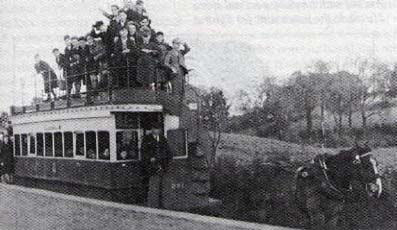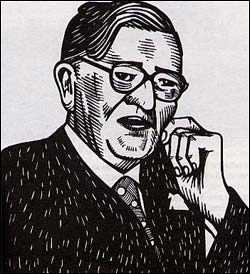|
Pat Smyth, a civil servant with the National Assistance Board in West Tyrone from the 1930's to the 1950's, recalls his memories, experiences and the larger than life personalities he encountered on the way.
Wilson Guy personified the truth of the old saying that 'it takes a wise man to act the fool.' In his stage and radio roles he was a most convincing impersonation of a rustic, uneducated, bumbling old fool from the back o' the mountain who kept his audiences in stitches: the aul' besom man from Tyrone' to a T.
He resided with his wife at 'Firgrove' Fintona where he had a most impressive radio transmitter. I got to know him well when he was a dedicated member of the Board's Appeals Tribunal. Often, he came early for meetings - earlier still when we got to know each other better. He used to regale me with incredible stories of the edicts of his grandmother, a zealous sabbatarian whose list of 'Thou shalt not's' must have been endless.
He was an enthralling raconteur with an equally endless flow of anecdotal material. He wrote books on all the tales from County Tyrone. An autographed copy of one, which I possess is inscribed 'This book was written with a view to preserving a fading picture.' All his works and stage performances reflected the idiosyncrasies of Tyrone folk.
When Marconi first installed wireless apparatus to link Ballycastle and Rathlin at the turn of the century, Wilson Guy was probably in his teens. The skill and dedication which he possessed and which he demonstrated in that field in later life would no doubt have come to the notice of those involved in launching the first B.B.C. Service at 21 Linenhall St., Belfast, in 1942, with Tyrone Guthrie as announcer.
Whatever the background, and no doubt 'John F. Tyrone' of Fintona had a hand in it, Wilson, in the role of 'the old besom man from County Tyrone', became one of the first comedians to gain a slot with what is now Radio Ulster. John F.'s real name was Moss and he was a neighbour of Wilson Guy.
In real life the latter was what he himself termed 'a butter twister', in other words a creamery Manager. He had an inexhaustible store of amusing anecdotes about local characters that he had met.
On first reading, before I got to know him better, I dismissed some of his stories as too far-fetched but soon my admiration of his way with words grew when I encountered people whose idiosyncrasies and appearances exactly matched Wilson's descriptions. I will give you a few of the anecdotes, which remain fresh in my mind.
Firstly, there is one about the pension officer who had foot slogged up a muddy loanen on a dark November day to reach a tiny cabin in the foothills of the mountains, one with only one apartment whose windows were small and virtually opaque with grime.
He had made straight for the table, where there was a glimmer of light, blindly following the old lady who had admitted him and immediately busied himself locating her claim form. Having got her name and address confirmed he remarked 'I take it you are a widow!' 'Well troth I am not, sir' she retorted. 'That's John himself sitting in the ashes.'
Through the gloom the pension officer had discerned the outline of an old man by the fireside, he shifted his chair nearer to the old boy and shouted 'Hello, what's your name? John McCullough? What age are you?' 'Ye needn't spake so loud, Mister. My hearing is the best part of me, I'm ninety.'
'Ninety!' the officer exclaimed. 'Then you will have had the pension for years?' 'Devil the bit of it,' the old boy chortled. 'I never looked for one.' 'Why not?' the officer demanded. 'Have you a bag of money? Do you not need it?' 'Feth I need it all right, Sir, came the reply, 'but I never had day's good health and bedam but I have been that busy dying this last twinty years that I niver got time to look for it.'
The officer was amazed but when he got all the particulars down, and checked the baptism certificates and the income, or rather the lack of it, he was able to assure the old couple that they would each get their full-rate pension of ten shillings a week right away.
Then there was a story about a poor man who had a stony patch of rocks on the side of a mountain near Clogher, for which he was being charged far too much rent. He decided 'to got to court', as they said in Tyrone, to bring his case before a judge and have a fair rent fixed.
He got an attorney and in due course the case came up at Omagh county court. A surveyor, friendly neighbours and others gave evidence in support of the tenant and the solicitor Alex Donnelly, the M.P. made a strong plea for a rent reduction.
After asking a lot of questions, Judge Shiels remarked, 'Where exactly does this holding lie? I cannot see it on this map'. At this the wee farmer jumped up. 'And not a bit of wonder, yer honour, sure it doesn't lie at all. It's standing on its one end half-way up Mullybaney black hill, where the sun niver shines.'
The tenant got his reduction and saved the court a lot of time going into the pros and cons, for Judge Charlie Shiels knew more about the Tyrone landscape than any attorney.
This was, of course, Carleton country, the setting for one of that celebrated author's greatest works. 'The Black Prophet'. Wilson Guy was a great admirer of William Carleton and expressed the hope that one day some suitable memorial to him would be erected to mark his birthplace.
He also had a great affection for John F. Moss alias John F. Tyrone' and retold for me an example of John F's wit and humour. It went rather like this.
'When the second attack on Belfast by the German bombers commenced in May 1941, a stampede towards Cave Hill began by all the occupants of working class houses in North and West Belfast. One harassed mother had three lads to gather up, as well as some portable belongings, and when she got out of the door the eldest boy, wee Hughie, was nowhere to be seen.
She went back in and let out a gulder (shout), but there was no response, so out she darted again. She spotted wee Hughie a piece down the street looking up at the sky and making rude gestures at the bombers. She rushed over and grabbed him by the scruff of his neck screeching.
'Hughie, for heaven's sake will ye stap, can't ye see yer aggravatin' them.'
Far from being a humble peddler of heather brooms, as the stage name 'A Bosom Man' implies, Wilson Guy was an erudite much-travelled genius with a unique skill in portraying in speech, in prose and in verse, authentic images of the people of County Tyrone. It is indeed a pity that his books are out of print. I cherish the annotated copies, which he gave me when I was leaving Omagh.
He reserved his highest praise for the whole Moss family of Fintons of which the actor, and solicitor, John F. Tyrone, was the most famous. Another called Harry had a pharmacy in Belfast. The Moss family had a prestigious house near the railway track used by the horse tram (locally dubbed 'The Van').
Their dog was trained to collect the daily paper from van-driver McClean, and fetch it home.

Fintona horse tram (called 'The Van').
Mat talked a lot about Dan Moss and his sisters, Kate and Ella. One of the family was widely famous as a calligraphist. Another was an Excise man across the water.
When I knew him during the war years. Mat, as he was popularly known, was in much demand for stage and radio, a most talented and popular performer. He was also a J.P. But it was his renown in the field of radio, which gave credence to rumours that he was involved in the development of essential radar and defence communications with his transmitter and receiver.
As a member of the Appeals Tribunals, he was firmly on the side of the underdog - always ready to come to the aid of those in most need of a spokesman and well able to distinguish between truth and fiction. No one had a better knowledge of the needs of his fellow man and his local knowledge was invaluable.
Above all, when poor people from the backward parts sat down and saw their old friend 'Mat' behind the table, they knew they had a friend at Court. The psychological boost of seeing someone they regarded as human was incalculable.

A sketch of 'Matt' Mulcahey' by Niall Dynes.
Pat Smyth, 2001
| |


